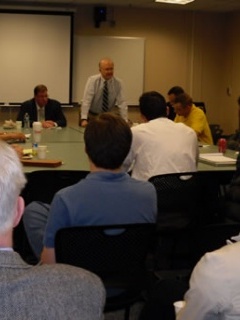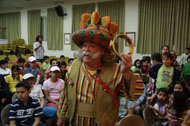Secretary-General Underlines Serious Challenges To Quest for Palestinian Statehood, Security for Israel
(Received from a UN Information Officer.)
QAWRA, Malta, 12 February ‑‑ "Confidence begets confidence; stability begets stability; security begets security; peace begets peace," said Secretary-General Ban Ki-moon today in a message to the International Meeting in Support of Israeli-Palestinian Peace, urging solid support for a resolution of the decades-old conflict.
Convinced that permanent status issues, including Jerusalem, borders, refugees, security, settlements and water, would be resolved only through negotiations, the Secretary-General beseeched the parties to respond positively to calls for a resumption of political talks and then work concertedly for quick, meaningful results, in a message delivered by his representative, Assistant Secretary-General for Political Affairs Oscar Fernandez-Taranco.
Setting a realistic tone for the two-day Meeting, organized jointly by the Committee on the Exercise of the Inalienable Rights of the Palestinian People and the Parliamentary Assembly of the Mediterranean (PAM), the Secretary-General acknowledged the persistence of daunting challenges in the shared quest for Palestinian statehood and self-determination, security and recognition for Israel, and lasting peace in the region.
He welcomed Israel's efforts to resume talks, but said a return to negotiations was seriously hampered by developments on the ground. He cited, in particular, continued settlement expansion in the Occupied Palestinian Territory, especially significant in East Jerusalem, where settlement infrastructure was being expanded and consolidated while Palestinians were being subjected to evictions, demolitions and revocations of residency rights.
"A way should be found, through negotiations, for Jerusalem to emerge as the capital of two States, with arrangements for the holy sites acceptable to all," he said. He reviewed the Palestinian Authority's reforms, deemed unacceptable the ongoing blockade of Gaza, and condemned renewed rocket fire from the enclave into Israel.
Pedro Núñez Mosquera, Chairman of the Delegation of the Committee on the Exercise of the Inalienable Rights of the Palestinian People, emphasized the urgency of addressing the five permanent status issues ‑‑ borders, Jerusalem, settlements, refugees and water ‑‑ as part of a renewed negotiation process. On borders, any changes to the 1967 lines could only occur by mutual agreement. Concerning Jerusalem, a sustainable settlement must include East Jerusalem as the capital of a future Palestinian State, he said.
According to the Committee, the announced 10-month settlement freeze in the occupied West Bank was "at best, partial and temporary", and all settlements in occupied territory were illegal and seriously impeded efforts to relaunch the peace talks. A durable solution to the refugee problem could only be achieved in the context of Palestinians' inalienable right of return to the homes and property from which they had been displaced. Finally, he stressed the importance of an early agreement on water, which respected the inalienable right of the Palestinian people to their own natural resources.
In another opening statement, the Deputy Prime Minister and Minister for Foreign Affairs of Malta and Representative of the host country, Tonio Borg, said that the continuing impasse and prevailing low confidence between the parties, compounded by the continued dramatic developments on the ground, were a source of major concern to all. Intense diplomatic activity had been directed at resumption of negotiations, but the desired breakthrough remained elusive. He urged the international community to continue to actively engage with the parties directly and with regional partners, and within the Quartet, in support of initiating a meaningful process leading to a "clear endgame".
He said that parliamentarians had a role in supporting Israeli-Palestinian peace and stability. That was where the added value of meetings such as this one lay. Not only were they an opportunity for Governments and institutions, but for representatives of legislators of Mediterranean States to discuss peace in the region. The conflict in the Middle East concerned the entire Mediterranean region. "We cannot simply pay lip service to the idea of a two-State solution without looking for opportunities to tangibly intensify contacts and creating the right climate for frank and constructive exchanges," he said.
In a high-level segment this morning, the President of the Egyptian People's Assembly, Ahmed Fathi Sorour, said the peace process was based on international legitimacy and grounded in past resolutions, agreements and principles. But despite the various proposals and negotiations throughout the decades, the Israeli vision of the peace process had reflected a great deal of vagueness and intransigence. Years of procrastination had ruined the efforts of many Governments. Today, the Israeli Government wanted to start the negotiations from zero and sought to suppress agreements on issues negotiated by its previous Governments.
Offering a recipe to break the impasse, he said that negotiations should be held within a binding time limit, under the Quartet's authority and in the framework of existing United Nations resolutions, international law and previous agreements and initiatives. Settlement activities must be discontinued and confidence-building measures must commence. Priority should be given to the borders issue; the refugee problem should be resolved as per the relevant General Assembly resolution. Continued killing and homelessness resulting from a continuation of this crisis would only beget more violence, instability and terror on both sides of the Mediterranean.
The Deputy Prime Minister and Minister of State of Turkey, Cemil Çiçek, said the framework for the peace process was clear ‑‑ embodied in relevant resolutions. The Israeli-Palestinian conflict lay at the centre of all interrelated and complex problems of the Middle East, and at the very core of the conflict, lay the issue of Jerusalem. A permanent solution required not only intergovernmental agreements, but mutual tolerance among the city's different communities. Without secure peace in Jerusalem, the chances of achieving sustainable stability in the region were "next to none".
He said that the ongoing settlement activities, both in Jerusalem and the West Bank, constituted serious obstacles for peace. And, thus, for negotiations to be relaunched, those activities must be totally halted. As Palestinians continued to emphasize, cessation of settlement activity was not a precondition, but an obligation of the Israeli side, emanating from the Road Map. A 10-month freeze fell short of meeting the expectations of the Palestinian side, as well as that of the international community and of Israeli obligations.
Opening statements this morning were also made by Rudy Salles, President of the Parliamentary Assembly of the Mediterranean; and Tayseer Quba'a, Deputy Speaker of the Palestinian National Council.
Plenary I, on the state of the peace process, heard first from Sa'eb Erakat, Head of the Negotiations Affairs Department of the Palestine Liberation Organization. He asserted that the Palestinian side had not put a single condition on negotiations. It did not demand any condition when it said Israel must stop settlement activities; that was an obligation emanating from the Road Map, and not a Palestinian condition. "To Netanyahu we say: there is a difference between dictation and negotiation," he stressed.
Now, he said, proximity talks looked to be the most advanced tools of decision-making since the Palestinians and Israelis had exhausted negotiations. It was indeed time for decisions, and those could not be made by negotiators. But he wondered whether the talks would be open-ended or sealed with a time frame, whether they would begin with borders, and what he would do if he found out in four months that the Israeli Government was not willing to engage on borders. "There will never be a Palestinian State without Gaza and the West Bank and East Jerusalem being a single territorial unit," he said.
A lecturer from The Hebrew University of Jerusalem and former negotiator, Alon Liel, said that many in Israel felt that the peace process had crashed to the extent that the two-State solution looked impossible at the moment. Even if the Americans managed to arrange proximity talks and enter a hotel and sit in one room, with the existing political map in Israel, "the gap is unbridgeable", he added. He acknowledged that with a broken heart, but did not see the possibility of a Palestinian State being created in the foreseeable future. And he was not even speaking of Jerusalem or refugees, but about borders only, he said.
As for the situation on the ground, he said it was unacceptable, both in Gaza and the West Bank. In fact, it was immoral and would only lead to more violence. At the same time, for Israel, the creation of one State with Palestinians ‑‑ where they had voting rights and so forth ‑‑ was an even bigger nightmare than the two-State solution. So he proffered to the conference that perhaps the Palestinians should propose that to the Israeli leadership today, adding: "They'll start shivering, I'm telling you."
Also speaking today was Hesham Youssef, on behalf of Amre Moussa, Secretary-General of the Arab League of States.
A brief discussion included a speaker on behalf of the United Arab Emirates and from the Egyptian Parliament.
The Meeting was scheduled to resume at 3 p.m.












 ATFP Senior Fellow Hussein Ibish addressed the Wednesday seminar series held by MIT's Security Studies Program on February 10, 2010. His talk focused on evaluating different scenarios for ending the Israeli-Palestinian conflict and the occupation that began in 1967. Ibish told the group of about 30 faculty and graduate students" I think we have to start an evaluation of these suggestions with two fairly obvious points which I think are not disputed by any serious commentator: first, that a military victory which resolves the conflict is not available to either party; and second, that the status quo is untenable and unacceptable to both. Neither Israel nor the Palestinians are going to go away or capitulate and abandon their national identities or projects. Therefore, in the absence of a resolution, or a process leading towards resolution, conflict will continue and there will be a generalized relationship of violence and indeed warfare."
ATFP Senior Fellow Hussein Ibish addressed the Wednesday seminar series held by MIT's Security Studies Program on February 10, 2010. His talk focused on evaluating different scenarios for ending the Israeli-Palestinian conflict and the occupation that began in 1967. Ibish told the group of about 30 faculty and graduate students" I think we have to start an evaluation of these suggestions with two fairly obvious points which I think are not disputed by any serious commentator: first, that a military victory which resolves the conflict is not available to either party; and second, that the status quo is untenable and unacceptable to both. Neither Israel nor the Palestinians are going to go away or capitulate and abandon their national identities or projects. Therefore, in the absence of a resolution, or a process leading towards resolution, conflict will continue and there will be a generalized relationship of violence and indeed warfare." 




















